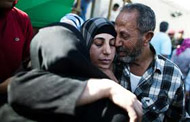
In a carefully orchestrated swap, Israel and Hamas carried out a prisoner exchange which saw the release of captured Israeli soldier Gilad Shalit for a total of 1,027 Palestinian political prisoners of which 477 were released in the first stage.
The swap, which entailed detailed coordination between Israel, Hamas and Egypt, which brokered the deal was carried out in the early morning hours of October 18 where Shalit was handed over by Hamas forces to the Egyptian mediator at the same time Gazan Palestinian prisoners were set free via Rafah and West Bank prisoners via an Israeli army post.
The prisoners, most of whom have been serving life sentences, included six Palestinians from inside Israel and 16 from east Jerusalem. President Mahmoud Abbas greeted the West Bank prisoners at his presidential compound in Ramallah amidst much fanfare and a rare show of Hamas and Fateh leaders side by side. Hamas leader Hasan Yousef and Legislative Council speaker Aziz Dweik, also Hamas, were seen standing next to Abbas in his welcome speech, grasping hands in a sign of victory.
The prisoner exchange, which was finalized through Egyptian mediation last week turned real later in the week when Israel began transferring prisoners slated for release. On October 17, over 400 men were transported to the Ketziot prison in the Negev Desert and 27 women prisoners were taken to the Telmond Prison. Meanwhile, Israeli families who lost loved ones in Palestinian attacks appealed to Israel’s High Court to stop the swap, saying the exchange included the men and women who were involved in the killing of their children. On the morning of October 17, the High Court rejected the appeals so the swap could proceed.
Unfortunately, not all of the freed Palestinian prisoners were allowed to return home. According to the conditions of the swap, 43 prisoners charged with the killing of Israelis and who were serving several consecutive life sentences were exiled outside of the country. On October 19, 16 Palestinians boarded flights to Damascus, Syria, 11 to Turkey, 15 to Qatar and one, Ahlam Tamimi, was returned to her birthplace, Jordan.
One prisoner exiled to Qatar, Abdul Hakim Hanini was to have his wife follow him. However, on October 21, Israeli authorities denied her permission to cross the Allenby Bridge into Jordan to continue on to Qatar and be with her husband. Hanini’s wife, who was accompanied by her in-laws and her three children said they were allowed to cross but she was sent back to the West Bank.
In addition, 200 prisoners from the West Bank were exiled to the Gaza Strip, prisoners who Israel deems too dangerous to be released into the West Bank.
Meanwhile, on the day of the swap, Palestinian prisoners on hunger strike for 23 days decided to suspend their strike after Israel stopped using its solitary confinement policy against them. Head of the Popular Front for the Liberation of Palestine, Ahmad Saadat, who was on hunger strike and briefly hospitalized, also suspended his strike after being informed by the prisoners’ representatives of their decision.
The swap did not take place without criticism, however. Noticeably missing from the list of freed detainees are the highest profile Palestinians, namely Ahmad Saadat and Fateh leader Marwan Barghouti. According to Hamas sources, Barghouti’s name was originally on the list but was rejected by Israel at the last minute.
The remaining 550 prisoners Israel agreed to free will be released in two months’ time. This list of prisoners is to be decided by Israeli authorities without Hamas interference but, according to Palestinian sources will only included political and not criminal prisoners. Speculation is that the prisoners to be released in the second phase of the swap will include the elderly, the sick and children.
In other news, Israeli Prime Minister Benjamin Netanyahu announced on October 21 that he was ready to partially freeze West Bank settlement building in exchange for a return to direct talks with the Palestinians. The offer, which the Palestinians said it has not officially received, has already been rejected by them, saying only a full freeze of settlement activity would be acceptable.
"We want to hear officially from the Israeli government that they accept to stop settlement on all Palestinian lands, including in Jerusalem and natural growth, and to recognize the 1967 borders," PLO official Saeb Erekat told AFP.
"The Israeli government knows very well how to inform us officially. Until now, no one has told us anything," he said.
Earlier in the week, on October 19, Prime Minister Salam Fayyad told the Washington-based ATFP the Palestinians’ assessment was that “the conditions are not ripe at this juncture for a meaningful resumption of talks.” He went on to say that the failure of the peace process so far was "not for lack of talks."
On the ground, Israeli settlers in the West Bank continue to wreak havoc on Palestinian farmers harvesting this year’s olive harvest. According to a press release from Oxfam on October 20, Israeli settlers have cost Palestinian farmers over $500,000 this year by destroying olive trees in various areas of the West Bank. The international organization emphasized how devastating the practice was.
"Burning an olive tree is like burning a farmer’s bank account," said Oxfam director Jeremy Hobbs. "Over 100,000 Palestinian families depend on the money they earn during harvest season. Especially because this is a bad harvest, every olive counts."
Oxfam documented that over 2,500 olive trees were destroyed in September alone with 7,500 this year.
According to Israeli NGO Yesh Din, in the 97 incidents of tree destruction documented between 2005 and 2010, no court cases have yet been brought against the culprits.







